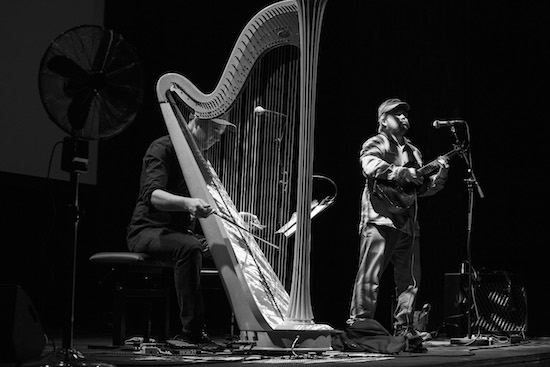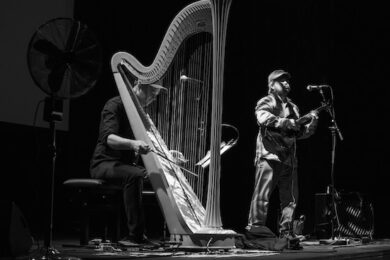The tastes of an omnivore
Ilan Volkov is the electricity powering ‘new music’ at the moment: the most energetic conductor and promoter around. Since 2012, his Tectonics festivals in Reykjavik and Glasgow have been exemplars of vibrant and diverse programming, reflecting his omnivorous interests in experimental classical, free improvisation, electronica, folk, world music, new hip-hop, and so on and so on. On paper, these events should be a bit of a mess, but his musical collisions explode with meaning.
The Tectonics ‘brand’ represents a singular boldness of vision, so it’s understandable that Oslo’s 2016 Only Connect festival has imported that ethos wholesale, drafting in Volkov for an “ideas exchange”. His fingerprints are evident throughout the two days’ events.
The orchestra has something to say
The lumbering old orchestra often seems stale and extraneous to experimental music; it’s a surprise to hear it totally refreshed in the opening concert, performed with dedication by the Oslo Philharmonic. Jim O’Rourke’s Come Back Soon makes the orchestra strange to itself, as it expresses a hesitant sentimentality. Something seems to be redacted here; we could be listening to a Van Dyke Parks arrangement with the Beach Boys muted out.
Cassandra Miller’s A Large House is even more unsettling. A large body of strings surrounds the audience and, over nearly half an hour, plays nothing but a huge ‘shepherd tone’: the auditory illusion of a chord endlessly descending in pitch. It is always the same, but as rarefied as whalesong, or the sounds collected by NASA. There’s a moment of pure magic at the end of the piece, when the glissandi freeze momentarily. The effect is like a window opening onto a hyperrealist landscape.
Øyvind Torvund’s Sweet Pieces counters Miller’s startling monument with something delicious and ludicrous. Garish orchestral orgasms, straight out of Golden Age Hollywood, crash up against Vangelis synths. The acoustic and electronic sounds chase each other through a hall of mirrors. It’s full of wicked humour but the surprise is the luxuriant beauty of Torvund’s orchestration.
Otomo Yoshihide is alive and well and appearing in Norway
The improvised element of the festival comes in several flavours and durations, including Mariam Rezaei’s performance/installation, MILK///, which she plays for three-and-a-half hour stretches on two days, occasionally joined by guest performers, such as bassist Michael Duch, who provides a bone-shaking foundation to Rezaei’s dense and haunting vinyl manipulations.
Christian Marclay mounts a stage littered with objects to manipulate, with mixed results: it turns out that there’s a limit to the sonic potential of some broken chairs and plastic sheeting. By contrast, Marclay’s Screen Play is an inspired work, a “video score” that prompts an improvisation from a trio of musicians (Lasse Marhaug, Christian Wallumrød and Ane Marthe Sørlien Holen). Edited from a huge archive of old film footage, Marclay’s mercurial match shots are full of weird drama, such as a skein of baby drool igniting upon hitting the floor.
A duo performance by Otomo Yoshihide (guitar) and Paal Nilssen-Love (drums) has both power and a composerly intelligence. Their downpours of noise subside to reveal bluesy vistas with a sinister edge. It made me regret how infrequently Yoshihide appears in the UK these days. He’s apparently quite often on the bill of Norwegian festivals though, alongside local improvisers. Nilssen-Love is a perfect foil for him: fierce, yet playful.
The power of quiet
The boldness of the Tectonics spirit counterpoints this noisiness with two concerts featuring some of the most delicate music around. Laurence Crane’s self-effacing melodies have a magnetic quality vastly at odds with their surface simplicity. The ensemble asamisimasa play three of his pieces, including the first-ever live performance of Events. This piece uses lists of celebrity birthdays, local weather conditions, and international exchange rates from 7th February 1997, setting them to music of beguiling transparency. It makes no sense that this gem has taken so long to reach a stage.
Catherine Lamb’s 40-minute Parallaxis Forma is the antithesis of Crane’s miniature forms, though similarly hushed. Long notes evolve into chords as cool as a wintery lake; crystalline melodies marry wordless voice to singing wineglasses. The experience of listening becomes paramount, as Lamb’s nuanced micro-tunings draw attention to the physicality of the sounds.
Richard Dawson will break your heart
Singer/guitarist Richard Dawson and ‘avant harpist’ Rhodri Davies (appearing in their HEN OGLEDD duo guise) close the festival with a performance that fuses improvisation and song to timeless effect. Dawson’s voice billows like a gale against Davies’ earthy, elemental harp, played with bows through distortion pedals. Dawson sings “Poor Old Horse”, unaccompanied, unamplified, with uncontained emotion, but it’s the windswept harp and guitar that really breaks your heart. The two musicians exchange a lucid melody, Davies reaching over to hand Dawson his bows in a great arc at the midway point. It’s gorgeous, generous and filled with humanity and wit – rare qualities in any kind music, let alone the experimental.



